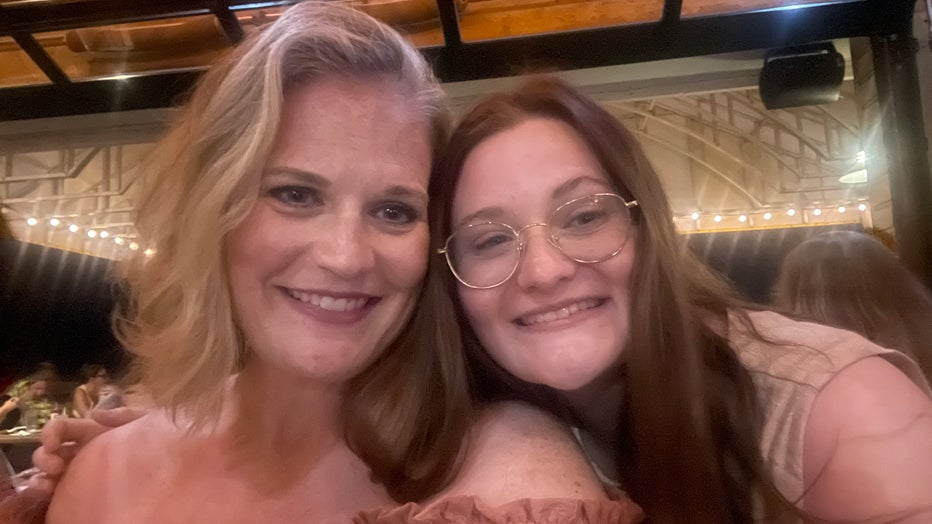After 30 years of failed diets, Cartersville teacher loses 150 pounds
150 pounds down and counting
Sara Tornicasa says weight loss surgery helped her get healthy. The Cartersville teacher talked to the FOX 5 Medical Team about her journey.
CARTERSVILLE, Ga. - On a recent afternoon, Sara Tornincasa is in her kitchen prepping a salad, supervised by her cat Binx, and soaking in how far she has come in the last 18 months.
At 46, the Cartersville High School ESL teacher and single mother of an 18-year-old daughter is now 150 pounds down, and healthy for the first time in her adult life.
"It has been a life-changing experience," Tornincasa says. "So, I've battled my weight all my life from the time I was small. At 15-years-old, I was on Weight Watchers. I have done Noom. I went to a medical weight loss center, where I took their medicine for 6 or 7 months and lost the weight and gained it right back."
Mother fights to lose weight
In 2017, nearing 40 and just over 300 pounds, Tornincasa says, she was trying to push her then 11-year-old daughter on a swing and found herself out of breath.
"I couldn't do it," she remembers. "I had to sit down, and I thought, 'This isn't what I want to be for the rest of my life. I don't want to be the inactive mom. I want to be active. I want to stay active. I want to be healthier. I want to feel better in my skin. "
She decided to try one more time to get control of her weight.
"And at the time, the State Health Benefit Plan did not cover bariatric surgery," she says. "And I'm honestly thankful that they didn't. Because, at that point, I started working with a nutritionist. I started working with a trainer. I got in the gym, I started learning about nutrition, and those things were pivotal to my success in this journey."
Mother finds weight-loss plan
After 2 years of doing everything she could to get healthier, in early 2022, Tornincasa learned the State Health Plan was now covering weight loss surgery for members who meet certain criteria.
"I made an appointment with my primary care doctor, and he said, 'You're the perfect candidate for this,'" she says.
Dr. John-Scott Carroll, a family medicine physician at Harbin Clinic in Rome, knew Tornincasa's medical history, much of it tied to her weight.
She had high blood pressure and severe acid reflux.
"I had just general pain, and I had an abnormal glucose level; I was pre-diabetic," Tornincasa says.
"Pre-diabetes means that there are signs of insulin resistance," Dr. Carroll says. "So, it is kind of a warning sign of, hey, you're risk of becoming diabetic in the future."
Dr. Carroll felt bariatric surgery could help Tornincasa head off type 2 diabetes and other weight-related complications.
And, he says, statistically, people with a body mass index (BMI) of 40 or higher, who are considered morbidly obese, have only about a 5% chance of getting to a BMI of 30 or less without surgery.

Cartersville, GA, teacher Sara Tornincasa with her daughter.
Mother undergoes gastric bypass
So, on October 31, 2022, at Atrium Floyd Health in Rome, Tornincasa underwent a gastric bypass, to reduce her stomach to a small pouch, so she would feel full after eating less food, and reroute her small intestine to absorb fewer calories.
"It is hard at first," she says. "You've gone from being able to eat whatever you want... I went from being able to sit down with a plate of food to just a few bites," she says.
The surgery quickly began paying off.
"After, I'd say about 3 months, I was like, 'Okay, this is this is actually working. This is really going to work," she says. "And it was after 6 months that I got to go out and start buying some new clothes."
Dr. Carroll says the procedure headed off a long list of potential health problems.
"She never developed type 2 diabetes," he says. "She never developed sleep apnea. She never had any complications of her high blood pressure."
Mother hits weight-loss goal
A year post-surgery, Sara Tornincasa hit her goal weight of about 150 pounds.
She is still there 18 months after her operation.
"I'm continuing to learn all that I can about healthy eating and continuing to work out those things are exceptionally important," she says. "I also partner that with therapy; I'm in therapy. I work with a therapist to help me out with the change because it is a tremendous change to lose 150 pounds."
Tornincasa encourages anyone interested in bariatric surgery to do some research.
"Understand what nutrition looks like, understand what exercise looks like," she says. "Talk to your doctor. Have an ongoing conversation. Let the people in your life know that you want to make a positive change in your life. Ask people for help, but please don't be afraid. This can be the greatest gift you've ever given yourself if you allow it to be."

